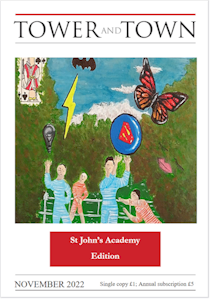

Tower and Town, November 2022 (view the full edition) (view the full edition)Reading George Eliot's 'Middlemarch'Winning entry for the 2022 Bath Spa 'Love Books' competition, run in conjunction with Marlborough Literature festival. She sits (with her back to the window, her left foot resting on the bedpost below, her back curved like the arc of a wave) and reads. Every so often she stretches the crick in her neck, moves her hair from the dip between her eyes and the sloping bridge of her nose, and glances at the people passing on the street below. A dog has surreptitiously done what it shouldn't have in the mud of the path (the owner is irritated but more anxious about the disparagement of his neighbour advancing towards them); a small, unprepossessing, boy in green khaki shorts is failing to fish his plastic buggy out of the stream. They are amusing but not consuming. Her protagonist - Dorothea - is far more nuanced in her disintegrating naivete, a far more lucrative prize to comprehend. So she returns to her book. She is coming to the denouement and yet all is still written in tranquillity, with unfaltering precision. Words hang perfectly on Dorothea's silken figure, following her every step without impeding her movement - without appearing masterful or painting her as a puppet. The entangled lives of Middlemarch run haphazardly through her hands - or through Eliot's? She seems to feel the quicksand presence of fingers clasping a pen, dipping in ink, an enigmatic flick of magnanimous wrist at the decision to bring the two lost lovers together in the drawing room at that moment, to counteract Casaubon's insensitive buffoonery with Will's confusion and heartache, to delve into Mary Garth's independence. The world dissolves at Eliot's loom and is remade into a weave of such depth, of such integrity, of such detail. Will Ladislaw's unthinking forays into the viper's nest - that tumultuous couple Rosamond and Tertius Lydgate - are balanced with his amiability towards our own Dorothea (whose disastrous match with the out and out villain Casaubon is redeemed by her unflinching thirst for knowledge). We are not pushed to our limits as a reader, we are simply led to the window and told what we don't look hard enough to see on the everyday street. Someone shouts downstairs and she straightens herself out. She has homework, violin practice, life, to be getting on with. But the image imprinted on her brain (of that woman staring with love at the hunched old man shrugging off the dawn and starting on his mountain of ploughing) is effervescent. She smiles. Only the greatest of writing can produce joy at the piecing together of a sentence. Not a word is out of place, or a scene misaligned. Middlemarch is real, Middlemarch is there hidden in the downs somewhere. `That scuffed old cover appears no more than a door to a different world. Astrid Wilson-Gignoux (Year 11) |